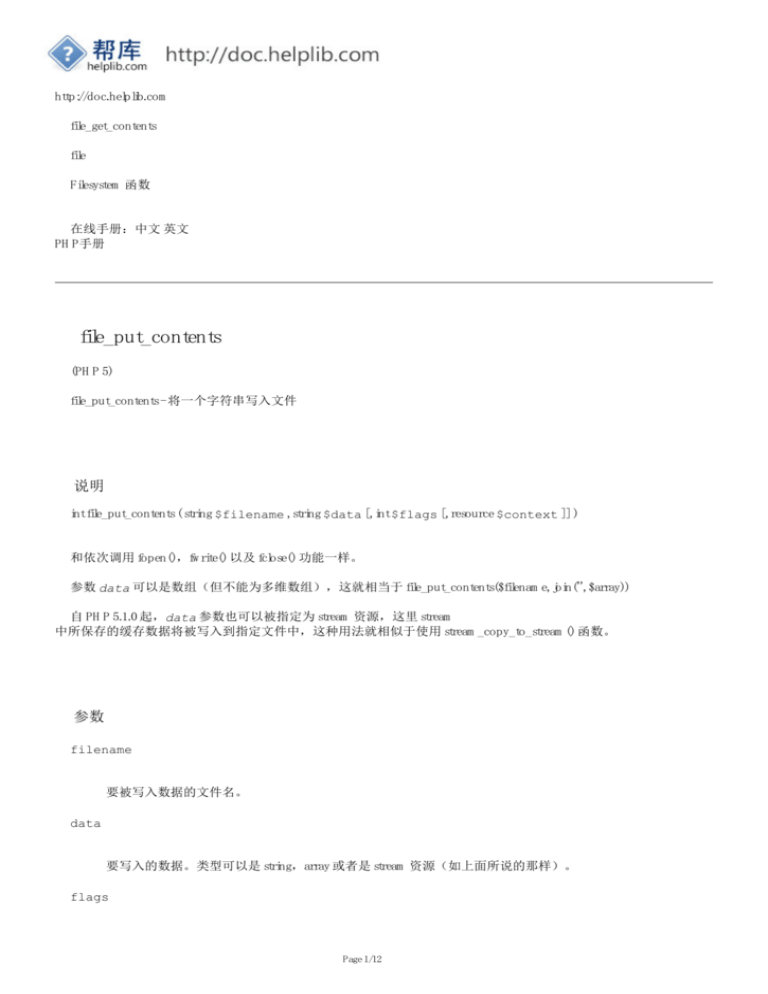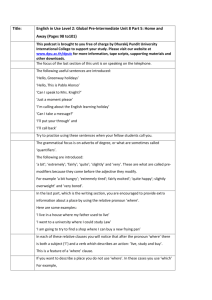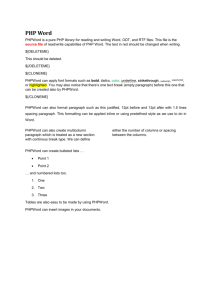
http://doc.helplib.com
file_get_contents
file
Filesystem 函数
在线手册:中文 英文
PHP手册
file_put_contents
(PHP 5)
file_put_contents - 将一个字符串写入文件
说明
int file_put_contents ( string $filename , string $data [, int $flags [, resource $context ]] )
和依次调用 fopen(),fwrite() 以及 fclose() 功能一样。
参数 data 可以是数组(但不能为多维数组),这就相当于 file_put_contents($filename, join('', $array))
自 PHP 5.1.0 起,data 参数也可以被指定为 stream 资源,这里 stream
中所保存的缓存数据将被写入到指定文件中,这种用法就相似于使用 stream_copy_to_stream() 函数。
参数
filename
要被写入数据的文件名。
data
要写入的数据。类型可以是 string,array 或者是 stream 资源(如上面所说的那样)。
flags
Page 1/12
flags 可以是 FILE_USE_INCLUDE_PATH,FILE_APPEND 和/或 LOCK_EX
(获得一个独占锁定),然而使用 FILE_USE_INCLUDE_PATH 时要特别谨慎。
context
一个 context 资源。
返回值
该函数将返回写入到文件内数据的字节数。
更新日志
版本
5.1.0
说明
添加了对 LOCK_EX 的支持和 data 参数处理 stream
资源的功能。
注释
Note: 此函数可安全用于二进制对象。
Note: 在 PHP 5.0.0 中增加了 对上下文(Context)的支持。 有关 上下文(Context) 的说明参见 Stream 函数。
Tip
如已启用fopen 包装器,在此函数中, URL 可作为文件名。关于如何指定文件名详见 fopen()。各种 wapper
的不同功能请参见 Supported Protocols and Wrappers,注意其用法及其可提供的预定义变量。
Page 2/12
参见
fopen() - 打开文件或者 URL
fwrite() - 写入文件(可安全用于二进制文件)
file_get_contents() - 将整个文件读入一个字符串
file_get_contents
file
Filesystem 函数
在线手册:中文 英文
PHP手册
用户评论:
ravianshmsr08 at gmail dot com (15-Dec-2010 05:39)
To upload file from your localhost to any FTP server.
pease note 'ftp_chdir' has been used instead of putting direct remote file
path....in ftp_put ...remoth file should be only file name
<?php
$host = '*****';
$usr = '*****';
$pwd = '**********';
$local_file = './orderXML/order200.xml';
$ftp_path = 'order200.xml';
$conn_id = ftp_connect($host, 21) or die ("Cannot connect to host");
ftp_pasv($resource, true);
ftp_login($conn_id, $usr, $pwd) or die("Cannot login");
// perform file upload
ftp_chdir($conn_id, '/public_html/abc/');
$upload = ftp_put($conn_id, $ftp_path, $local_file, FTP_ASCII);
if($upload) { $ftpsucc=1; } else { $ftpsucc=0; }
// check upload status:
print (!$upload) ? 'Cannot upload' : 'Upload complete';
print "\n";
// close the FTP stream
ftp_close($conn_id);
?>
Page 3/12
error at example dot com (12-Dec-2010 04:47)
It's worth noting that you must make sure to use the correct path when working with
this function. I was using it to help with logging in an error handler and sometimes
it would work - while other times it wouldn't. In the end it was because sometimes it
was called from different paths resulting in a failure to write to the log file.
__DIR__ is your friend.
hilton at allcor dot com dot br (04-Nov-2010 08:20)
NOTE : file_put_contents create files UTF-8
<?php
$myFile = 'test.txt';
$myContent = 'I love PHP';
file_put_contents($myFile, utf8_encode($myContent));
?>
clement dot delmas at gmail dot com (17-Sep-2010 09:22)
NOTE : file_put_contents doesn't add a valid BOM while creating the file
<?php
$myFile = 'test.txt';
$myContent = 'I love PHP';
file_put_contents($myFile, "\xEF\xBB\xBF".$myContent);
?>
deqode at felosity dot nl (16-Feb-2010 04:14)
Please note that when saving using an FTP host, an additional stream context must
be passed through telling PHP to overwrite the file.
<?php
/* set the FTP hostname */
$user = "test";
$pass = "myFTP";
$host = "example.com";
$file = "test.txt";
$hostname = $user . ":" . $pass . "@" . $host . "/" . $file;
/* the file content */
$content = "this is just a test.";
Page 4/12
/* create a stream context telling PHP to overwrite the file */
$options = array('ftp' => array('overwrite' => true));
$stream = stream_context_create($options);
/* and finally, put the contents */
file_put_contents($hostname, $content, 0, $stream);
?>
John Galt (30-Jul-2009 03:14)
I use file_put_contents() as a method of very simple hit counters. These are two
different examples of extremely simple hit counters, put on one line of code, each.
Keep in mind that they're not all that efficient. You must have a file called
counter.txt with the initial value of 0.
For a text hit counter:
<?php
$counter = file_get_contents("counter.txt"); $counter++; file_put_contents(
"counter.txt", $counter); echo $counter;
?>
Or a graphic hit counter:
<?php
$counter = file_get_contents("counter.txt"); $counter++; file_put_contents(
"counter.txt", $counter); for($i = 0; $i < strlen($counter); $i++) echo "<img
src=\"counter/".substr($counter, $i, 1).".gif\" alt=\"".substr($counter, $i, 1)."\"
/>";
?>
wjsams at gmail dot com (25-Jun-2009 11:57)
file_put_contents() strips the last line ending
If you really want an extra line ending at the end of a file when writing with
file_put_contents(), you must append an extra PHP_EOL to the end of the line as
follows.
<?php
$a_str = array("these","are","new","lines");
$contents = implode(PHP_EOL, $a_str);
$contents .= PHP_EOL . PHP_EOL;
file_put_contents("newfile.txt", $contents);
print("|$contents|");
?>
You can see that when you print $contents you get two extra line endings, but if
you view the file newfile.txt, you only get one.
Page 5/12
kola_lola at hotmail dot com (07-Nov-2008 07:31)
I wrote this script implementing the file_put_contents() and file_get_contents()
functions to be compatible with both php4.* and php 5.*. It is a PHP Command line
interface script which searches and replaces a specific word recursively through all
files in the supplied directory hierarchy.
Usage from a Linux command line: ./scriptname specifieddirectory searchString
replaceString
#!/usr/bin/php
<?php
$argc = $_SERVER['argc'];
$argv = $_SERVER['argv'];
if($argc != 4)
{
echo "This command replaces a search string with a replacement string\n for the
contents of all files in a directory hierachy\n";
echo "command usage: $argv[0] directory searchString replaceString\n";
echo "\n";
exit;
}
?><?php
if (!function_exists('file_put_contents')) {
function file_put_contents($filename, $data) {
$f = @fopen($filename, 'w');
if (!$f) {
return false;
} else {
$bytes = fwrite($f, $data);
fclose($f);
return $bytes;
}
}
}
function get_file_contents($filename)
/* Returns the contents of file name passed
*/
{
if (!function_exists('file_get_contents'))
{
$fhandle = fopen($filename, "r");
$fcontents = fread($fhandle, filesize($filename));
fclose($fhandle);
}
else
{
Page 6/12
$fcontents = file_get_contents($filename);
}
return $fcontents;
}
?><?php
function openFileSearchAndReplace($parentDirectory, $searchFor, $replaceWith)
{
//echo "debug here- line 1a\n";
//echo "$parentDirectory\n";
//echo "$searchFor\n";
//echo "$replaceWith\n";
if ($handle = opendir("$parentDirectory")) {
while (false !== ($file = readdir($handle))) {
if (($file != "." && $file != "..") && !is_dir($file)) {
chdir("$parentDirectory"); //to make sure you are always in right directory
// echo "$file\n";
$holdcontents = file_get_contents($file);
$holdcontents2 = str_replace($searchFor, $replaceWith, $holdcontents);
file_put_contents($file, $holdcontents2);
// echo "debug here- line 1\n";
// echo "$file\n";
}
if(is_dir($file) && ($file != "." && $file != ".."))
{
$holdpwd = getcwd();
//echo "holdpwd = $holdpwd \n";
$newdir = "$holdpwd"."/$file";
//echo "newdir = $newdir \n"; //for recursive call
openFileSearchAndReplace($newdir, $searchFor, $replaceWith);
//echo "debug here- line 2\n";
//echo "$file\n";
}
}
closedir($handle);
}
}
$parentDirectory2 = $argv[1];
$searchFor2 = $argv[2];
$replaceWith2 = $argv[3];
//Please do not edit below to keep the rights to this script
//Free license, if contents below this line is not edited
echo "REPLACED\n'$searchFor2' with '$replaceWith2' recursively through directory
listed below\nFor all files that current user has write permissions for\nDIRECTORY:
'$parentDirectory2'\n";
echo "command written by Kolapo Akande :) all rights reserved :)\n";
$holdpwd = getcwd();
//echo "$holdpwd\n";
chdir($parentDirectory2);
openFileSearchAndReplace($parentDirectory2, $searchFor2, $replaceWith2);
Page 7/12
exit;
?>
admin at nabito dot net (04-Aug-2008 04:11)
This is example, how to save Error Array into simple log file
<?php
$error[] = 'some error';
$error[] = 'some error 2';
@file_put_contents('log.txt',date('c')."\n".implode("\n", $error),FILE_APPEND);
?>
TrentTompkins at gmail dot com (02-Jul-2008 08:25)
File put contents fails if you try to put a file in a directory that doesn't exist.
This creates the directory.
<?php
function file_force_contents($dir, $contents){
$parts = explode('/', $dir);
$file = array_pop($parts);
$dir = '';
foreach($parts as $part)
if(!is_dir($dir .= "/$part")) mkdir($dir);
file_put_contents("$dir/$file", $contents);
}
?>
Anonymous (03-May-2008 02:06)
file_put_contents() will cause concurrency problems - that is, it doesn't write
files atomically (in a single operation), which sometimes means that one php script
will be able to, for example, read a file before another script is done writing that
file completely.
The following function was derived from a function in Smarty
(http://smarty.php.net) which uses rename() to replace the file - rename() is atomic
on Linux.
On Windows, rename() is not currently atomic, but should be in the next release.
Until then, this function, if used on Windows, will fall back on unlink() and
rename(), which is still not atomic...
Page 8/12
<?php
define("FILE_PUT_CONTENTS_ATOMIC_TEMP", dirname(__FILE__)."/cache");
define("FILE_PUT_CONTENTS_ATOMIC_MODE", 0777);
function file_put_contents_atomic($filename, $content) {
$temp = tempnam(FILE_PUT_CONTENTS_ATOMIC_TEMP, 'temp');
if (!($f = @fopen($temp, 'wb'))) {
$temp = FILE_PUT_CONTENTS_ATOMIC_TEMP . DIRECTORY_SEPARATOR . uniqid('temp');
if (!($f = @fopen($temp, 'wb'))) {
trigger_error("file_put_contents_atomic() : error writing temporary file '$temp'",
E_USER_WARNING);
return false;
}
}
fwrite($f, $content);
fclose($f);
if (!@rename($temp, $filename)) {
@unlink($filename);
@rename($temp, $filename);
}
@chmod($filename, FILE_PUT_CONTENTS_ATOMIC_MODE);
return true;
}
?>
the geek man at hot mail point com (03-Jan-2008 07:23)
I use the following code to create a rudimentary text editor. It's not fancy, but
then it doesn't have to be. You could easily add a parameter to specify a file to
edit; I have not done so to avoid the potential security headaches.
There are still obvious security holes here, but for most applications it should be
reasonably safe if implemented for brief periods in a counterintuitive spot. (Nobody
says you have to make a PHP file for that purpose; you can tack it on anywhere, so
long as it is at the beginning of a file.)
<?php
$random1 = 'randomly_generated_string';
$random2 = 'another_randomly_generated_string';
$target_file = 'file_to_edit.php';
$this_file = 'the_current_file.php';
if ($_REQUEST[$random1] === $random2) {
Page 9/12
if (isset($_POST['content']))
file_put_contents($target_file, get_magic_quotes_qpc() ? stripslashes($_POST[
'content']) : $_POST['content']);
die('<!DOCTYPE html PUBLIC "-//W3C//DTD XHTML 1.1//EN"
"http://www.w3.org/TR/xhtml11/DTD/xhtml11.dtd">
<html xmlns="http://www.w3.org/1999/xhtml" xml:lang="en" lang="en">
<head>
<title>Editing...</title>
</head>
<body>
<form method="post" action="' . $this_file . '" />
<input type="hidden" name="' . $random1 . '" value="' . $random2 . '" />
<textarea name="content" rows="50" cols="100">' . file_get_contents($target_file) .
'</textarea><br />
<input type="submit" value="Save Changes" />
</form>
</body>
</html>');
}
?>
Then simply browse to hxxp://www.example.com/{$this_file}?{$random1}={$random2},
with the appropriate values substituted for each bracketed variable. Please note that
this code assumes the target file to be world writable (-rw-rw-rw- or 666) and will
fail to save properly without error if it is not.
Once again, this is by no means secure or permanent, but as a quick fix for brief
edits to noncritical files it should be sufficient, and its small size is a definite
bonus.
egingell at sisna dot com (21-Dec-2007 11:15)
There is a better way. www.php.net/touch
Since you're not adding anything to the file,
<?php
function updateFile($filename) {
if (!file_exists($filename)) return;
touch($filename);
}
?>
me at briandichiara dot com (05-Oct-2007 03:20)
I was in need of a function that updated the last modified date in a php file.
There may be a better way, but this is how I did it:
Page 10/12
<?php
function updateFile($modFile){
if(!empty($modFile)){
if($fo = fopen($modFile, 'r')){
$source = '';
while (!feof($fo)) {
$source .= fgets($fo);
}
file_put_contents($modFile,$source);
fclose($fo);
}
}
}
?>
Curtis (21-Dec-2006 07:20)
As to the previous user note, it would be wise to include that code within a
conditional statement, as to prevent re-defining file_put_contents and the
FILE_APPEND constant in PHP 5:
<?php
if ( !function_exists('file_put_contents') && !defined('FILE_APPEND') ) {
...
}
?>
Also, if the file could not be accessed for writing, the function should return
boolean false, not 0. An error is different from 0 bytes written, in this case.
egingell at sisna dot com (23-Jul-2006 07:11)
In reply to the previous note:
If you want to emulate this function in PHP4, you need to return the bytes written
as well as support for arrays, flags.
I can only figure out the FILE_APPEND flag and array support. If I could figure out
"resource context" and the other flags, I would include those too.
<?
define('FILE_APPEND', 1);
function file_put_contents($n, $d, $flag = false) {
$mode = ($flag == FILE_APPEND || strtoupper($flag) == 'FILE_APPEND') ? 'a' : 'w';
$f = @fopen($n, $mode);
if ($f === false) {
return 0;
} else {
Page 11/12
if (is_array($d)) $d = implode($d);
$bytes_written = fwrite($f, $d);
fclose($f);
return $bytes_written;
}
}
?>
sendoshin at awswan dot com (06-Mar-2006 03:01)
To clear up what was said by pvenegas+php at gmail dot com on 11-Oct-2005 08:13,
file_put_contents() will replace the file by default. Here's the complete set of
rules this function follows when accessing a file:
1. Was FILE_USE_INCUDE_PATH passed in the call? If so, check the include path for
an existing copy of *filename*.
2. Does the file already exist? If not, first create it in the current working
directory. Either way, open the file.
3. Was LOCK_EX passed in the call? If so, lock the file.
4. Was the function called with FILE_APPEND? If not, clear the file's contents.
Otherwise, move to the end of the file.
5. Write *data* into the file.
6. Close the file and release any locks.
If you don't want to completely replace the contents of the file you're writing to,
be sure to use FILE_APPEND (same as fopen() with 'a') in the *flags*. If you don't,
whatever used to be there will be gone (fopen() with 'w').
Hope that helps someone (and that it makes sense ^^)!
- Sendoshin
aidan at php dot net (21-May-2004 10:11)
This functionality is now implemented in the PEAR package PHP_Compat.
More information about using this function without upgrading your version of PHP
can be found on the below link:
http://pear.php.net/package/PHP_Compat
http://doc.helplib.com
Page 12/12
Powered by TCPDF (www.tcpdf.org)



